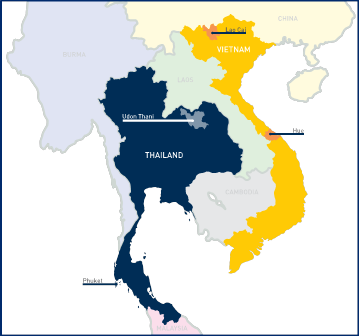The United States Agency for International Development’s Mekong-Building Climate Resilient Asian Cities program is working to address the effects of climate change in four medium-sized cities in Thailand and Vietnam, two countries that are experiencing rapid urbanization and population growth.

The cities of Phuket and Udon Thani in Thailand and Hue and Lao Cai in Vietnam are particularly vulnerable to the effects of climate change. Much of the critical urbanization and industrialization is happening in river basins, deltas and coastal areas that are particularly exposed. Urbanization creates dependency on critical municipal systems such as water supplies and utilities that can have enormous implications for people who are already poor and for many more who are at risk of becoming poor.
PROMOTING INCLUSIVE PLANNING
Mekong-Building Climate Resilient Asian Cities promotes equitable social development and ensures effective participation of vulnerable and marginalized groups, paying particular attention to issues of ethnicity and gender.
The program promotes learning dialogue among city stakeholders that leads to locally-owned resilience strategies to address the impacts of climate change. It also strengthens stakeholder knowledge and awareness of urban climate change vulnerabilities and resilience to enhance capacity to plan for and take action to address climate change and tests and refines methods, tools and training guidelines to expand and scale up the programs.
THE CLIMATE RESILIENCE FRAMEWORK
The Climate Resilience Framework seeks to assess vulnerabilities and risks, identify resilience strategies, and create an open, inclusive learning process to identify specific measures to address the uncertainties of climate change.
The framework supports a collaborative planning process based on the core components of the resilience framework (systems, agents, institutions), and their characteristics. The resilience planning process includes three main activities: a vulnerability assessment, the implementation of interventions, and an iterative shared learning approach to guide the entire process.
For additional information, visit www.i-s-e-t.org/projects-and-programs/resilience-to-climate-change
PARTNERS
Institute for Social and Environmental Transition, Thailand Environment Institute and National Institute for Science and Technology Policy and Strategy Studies. The program is also co-funded by The Rockefeller Foundation.







Comment
Make a general inquiry or suggest an improvement.